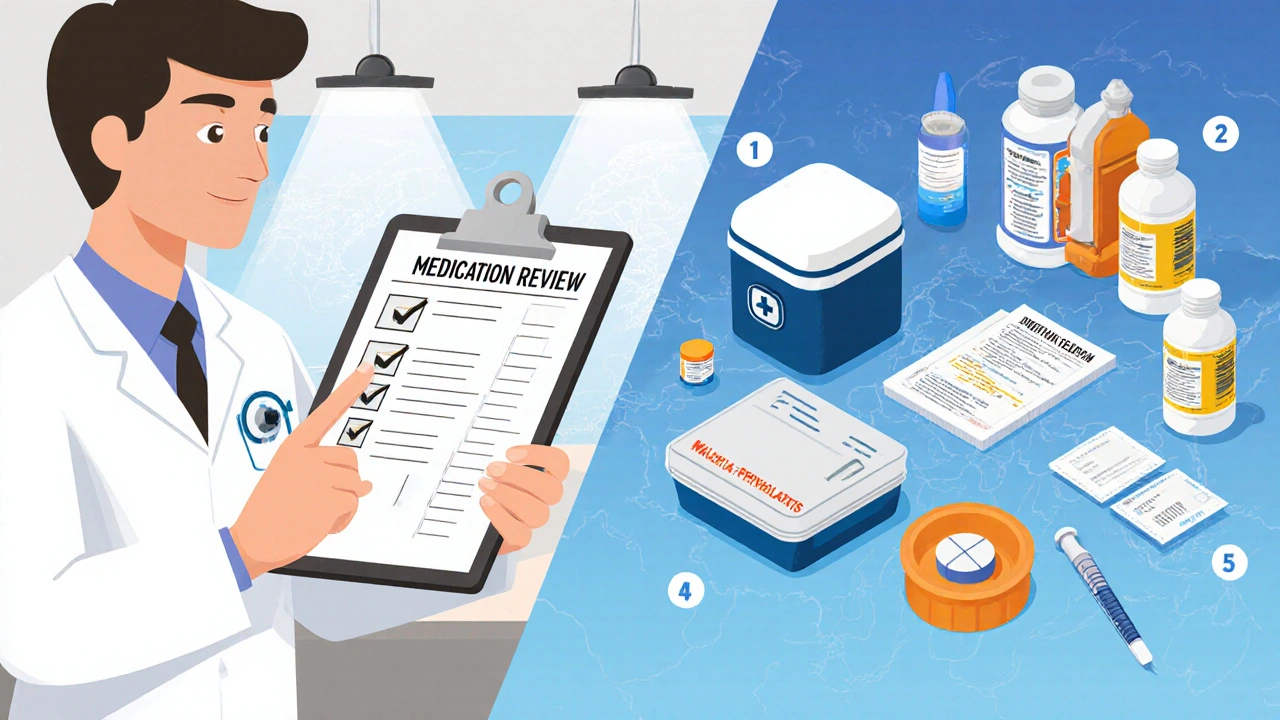Medication Time Zone Converter
Convert Your Medication Schedule
Converted Medication Time
Destination Time:
Set your alarm to remind you 15 minutes before this time
Picture this: you’ve just landed in a new city, the air smells different, and you’re itching to explore. But if you live with Kaposi sarcoma, the excitement can be shadowed by worries about flare‑ups, infections, or medication mishaps. This guide walks you through practical steps to travel safely, keep your skin lesions in check, and protect the immune system while you’re away.
What is Kaposi Sarcoma?
Kaposi sarcoma is a vascular tumor that usually appears as purplish skin lesions, often linked to a weakened immune system. It most commonly affects people with HIV, but can also arise in organ‑transplant recipients or anyone with a compromised immune response. The disease is driven by Human herpesvirus 8 (HHV‑8), a virus that remains dormant in the body and reactivates when immunity drops.
Why Travel Needs Extra Care
Travel puts the body under stress: jet lag, new climates, different food, and potential exposure to unfamiliar pathogens. For a person with Kaposi sarcoma, these stressors can trigger lesion growth or make existing lesions more painful. Moreover, being far from familiar doctors means you must be prepared to manage medications, handle emergencies, and keep up with routine monitoring.
Pre‑Travel Medical Checklist
- Consult Your Healthcare Team - Schedule an appointment at least six weeks before departure. Discuss your itinerary, any upcoming procedures, and whether you need a medication refill.
- Antiretroviral therapy (ART) review - Ensure your HIV regimen is stable. Ask your doctor to provide a written summary of your ART and Kaposi sarcoma treatment plan.
- Travel vaccinations - Some vaccines (e.g., yellow fever, hepatitis A) are safe for immunocompromised patients, but live vaccines may be contraindicated. Get a personalized immunization schedule.
- Malaria prophylaxis - If traveling to endemic regions, choose a prophylactic regimen that does not interact with your current meds.
- Prepare a medication kit - Pack enough pills for the entire trip plus a 10‑day emergency supply. Use a resealable bag and keep a cardboard list with drug names, dosages, and timing.
Managing Medications Abroad
Keeping ART and Kaposi sarcoma treatments on schedule is non‑negotiable. Here are practical tips:
- Time zone tricks: Convert your dosing times to the destination’s local time before you leave. Set alarms on your phone for each dose.
- Temperature control: Some pills need refrigeration. Carry a small insulated cooler with a reusable ice pack if you’ll be in hot climates.
- Documentation: Carry a doctor’s letter (in the local language, if possible) describing your condition and listing each medication. This smooths customs checks.
- Backup plan: Identify a pharmacy in the destination city that can fill your prescriptions in case of loss or damage.

Skin Care and Sun Protection
Kaposi sarcoma lesions can become more vascular and bleed when exposed to intense sunlight. Follow these skin‑care rules:
- Apply a broad‑spectrum sunscreen SPF 30 or higher at least 15 minutes before heading outdoors. Reapply every two hours, or after swimming.
- Wear protective clothing - long‑sleeved shirts, wide‑brim hats, and UV‑blocking sunglasses.
- If you notice a new or worsening lesion, clean the area with mild soap and a sterile gauze. Avoid scratching, which can lead to secondary infection.
Nutrition and Immune Support
Food can be both a comfort and a risk. Opt for a balanced diet rich in antioxidants, protein, and healthy fats. Probiotic‑rich foods (yogurt, kefir, kimchi) help maintain gut health, which is linked to immune regulation.
Avoid raw or undercooked meats and unpasteurized dairy in regions with higher food‑borne illness rates. Stay hydrated, especially on long flights, as dehydration can stress the immune system.
Dealing with Infections and Illness on the Road
Because a weakened immune system makes infections more serious, act fast if you feel unwell.
- Fever or flu‑like symptoms: Seek medical attention promptly. Carry a thermometer and a basic travel medical kit (acetaminophen, oral rehydration salts).
- Skin infections: If a Kaposi lesion becomes red, warm, or oozes pus, treat it as a possible bacterial infection. Topical antibiotics may help, but a doctor’s evaluation is safest.
- Remote care: Many hospitals now offer telemedicine services. Have a video‑call platform ready and a local emergency number saved.

Emergency Preparedness
The unexpected can happen, so plan ahead.
- Medical travel insurance: Choose a policy that covers pre‑existing conditions, hospital stays, and evacuation. Verify the network includes hospitals experienced in treating immunocompromised patients.
- Local emergency contacts: Write down the address and phone number of the nearest tertiary hospital and your country’s embassy.
- Backup copies: Save digital copies of your medical records, lab results, and prescription list in a secure cloud folder.
Post‑Travel Follow‑Up
Once you’re back home, schedule a check‑up within two weeks. Your doctor will want to see:
- Any new or worsening lesions.
- Lab results for CD4 count and viral load if you’re HIV‑positive.
- Potential side‑effects from any prophylactic meds you took.
Document the experience - note the places you visited, any health issues, and what worked well. This record helps fine‑tune future travel plans.
Quick Travel Checklist for Kaposi Sarcoma
- Doctor’s appointment & medication review.
- Written prescription summary and doctor’s letter.
- Vaccination record and malaria prophylaxis plan.
- Travel‑ready medication kit (incl. temperature control).
- Sunscreen SPF 30+, UV‑protective clothing.
- Balanced diet plan and safe water sources.
- Telemedicine app installed & emergency numbers saved.
- Medical travel insurance covering pre‑existing conditions.
- Post‑travel follow‑up appointment scheduled.
Frequently Asked Questions
Can I get a COVID‑19 vaccine if I have Kaposi sarcoma?
Yes. mRNA COVID‑19 vaccines are safe for immunocompromised individuals, including those with Kaposi sarcoma. Live‑attenuated vaccines should be avoided unless your doctor says otherwise.
What should I do if a lesion starts bleeding while I’m traveling?
Apply gentle pressure with a clean gauze pad. Elevate the area if possible. If bleeding doesn’t stop after 10 minutes, seek medical help - it may need suturing or antibiotic coverage.
Are there any foods I should avoid?
Steer clear of raw seafood, unpasteurized dairy, and undercooked meats in regions where food‑borne pathogens are common. Stick to cooked vegetables, fruits you can peel, and bottled water.
How can I keep my antiretroviral therapy on schedule across time zones?
Before you depart, calculate your dosing times for the destination’s local clock. Use phone alarms labeled with the medication name to avoid confusion.
Is travel insurance worth it for someone with Kaposi sarcoma?
Absolutely. Look for policies that explicitly cover pre‑existing conditions, hospital stays, and medical evacuation. It can save thousands if a complication arises.








15 Comments